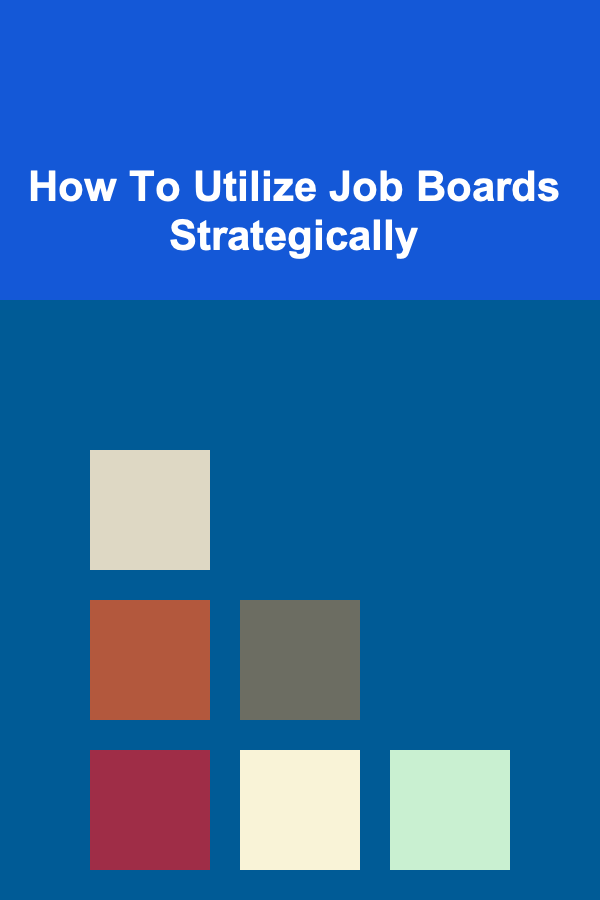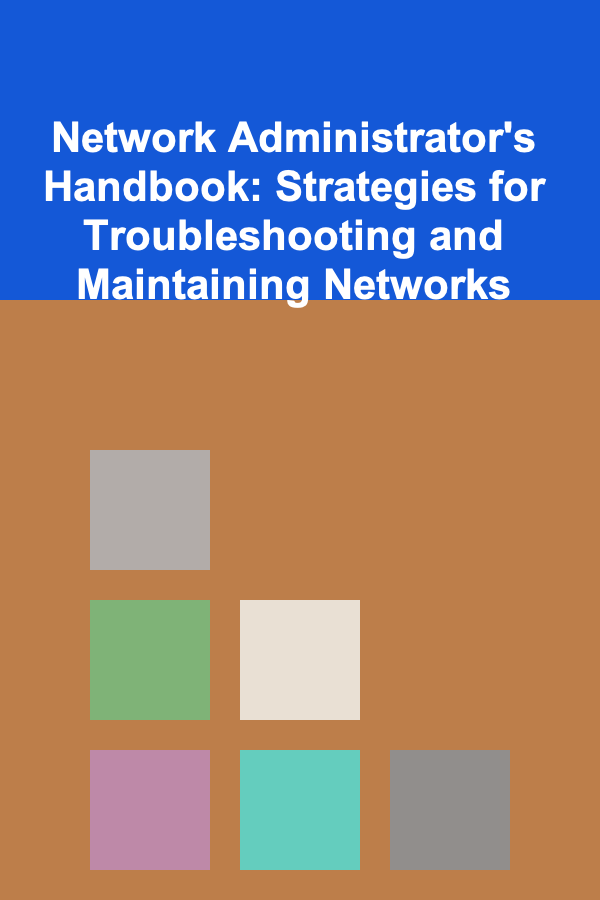
How To Utilize Job Boards Strategically
ebook include PDF & Audio bundle (Micro Guide)
$12.99$11.99
Limited Time Offer! Order within the next:

In the ever-evolving job market, job boards have become an essential tool for both job seekers and recruiters. Whether you're actively searching for a new career opportunity or looking to hire top talent, job boards can provide a wealth of resources. However, to maximize their potential, it's essential to use them strategically. Simply browsing through job listings isn't enough to stand out from the crowd. By understanding how job boards work and tailoring your approach, you can effectively boost your chances of success, whether you are a job seeker or an employer.
In this article, we will explore how to strategically utilize job boards, focusing on both the job seeker's and recruiter's perspectives.
Understanding Job Boards
Before delving into the specifics of how to utilize job boards, it's essential to have a clear understanding of what job boards are and the different types available. Job boards are online platforms that list job openings from employers looking for candidates. These boards range from general-purpose sites to those catering to specific industries or job types.
Types of Job Boards
- General Job Boards: These include platforms like Indeed, Glassdoor, and LinkedIn. They cover a wide range of industries and professions.
- Niche Job Boards: These are tailored to specific industries, job functions, or geographic areas. For example, AngelList focuses on startups, and WeWorkRemotely specializes in remote jobs.
- Company-Specific Job Boards: Many large companies maintain their own job boards where they list vacancies directly on their websites.
- Freelance Platforms: Sites like Upwork, Fiverr, and Freelancer are ideal for those seeking freelance work or temporary roles.
Job seekers and employers alike must understand the unique features and advantages of each type of job board in order to make an informed decision.
Strategic Job Seeking: How Job Seekers Can Leverage Job Boards
When you're on the hunt for a job, job boards can be your best friend, but only if used effectively. Here are some strategies that will help you stand out from the competition.
2.1 Tailor Your Resume and Cover Letter
One of the key mistakes job seekers make is submitting the same resume and cover letter for every job application. To stand out on job boards, you must tailor your application for each role. Use keywords from the job description to ensure your resume aligns with the employer's requirements.
- Optimize for Keywords: Many companies use applicant tracking systems (ATS) to filter resumes. Make sure your resume includes relevant keywords from the job posting, such as specific skills, qualifications, and job titles.
- Customization: While your core resume can remain the same, adjust your work experience, skills, and achievements to reflect the job's requirements. This increases your chances of being noticed.
2.2 Set Up Job Alerts
Job boards allow you to set up job alerts based on your preferences. This can save you a significant amount of time in your job search. Here's how to make the most out of job alerts:
- Be Specific: Set up alerts that match your ideal job. Use filters for industry, job title, location, salary, and job type.
- Frequency: Choose how often you want to receive alerts. A daily alert will keep you updated without overwhelming you with emails.
- Refine Your Search: Experiment with your search parameters. If you're not getting the results you want, refine your filters to make them more specific.
2.3 Use Advanced Search Features
Most job boards have advanced search features that allow you to narrow down job listings based on various criteria, including experience level, company size, and salary range. Using these advanced search options can help you find the best-fit opportunities more efficiently.
- Boolean Searches: Some job boards support Boolean search, which allows you to use operators like "AND," "OR," and "NOT" to create more complex queries. This can help you find exactly what you're looking for.
- Saved Searches: Many platforms allow you to save your search criteria. This ensures that you don't have to repeat the same search every time you log in.
2.4 Apply Quickly and Strategically
Job boards allow you to apply for multiple positions quickly, but this can work against you if you're not selective. Applying for every job you find may seem like a good strategy, but it's more important to focus on quality over quantity.
- Focus on Relevance: Apply only for positions that are a strong match for your skills, qualifications, and career goals.
- Track Applications: Keep a spreadsheet or use a job application tracker to monitor where you've applied, the dates, and any follow-up actions.
2.5 Engage With Employers and Hiring Managers
Many job boards allow you to interact with potential employers. For instance, platforms like LinkedIn offer networking opportunities where you can directly engage with recruiters and hiring managers.
- Reach Out: Don't be afraid to send a polite, personalized message to recruiters, expressing interest in the role. A direct message can help you stand out.
- Follow Employers: Many job boards let you follow companies that interest you. This gives you the chance to stay updated on new job openings and company news.
2.6 Don't Rely Solely on Job Boards
While job boards are a great tool, you should not rely on them as your only job-search method. Networking, informational interviews, and direct outreach to employers are equally important. Job boards are just one piece of the puzzle.
- Leverage Social Media: Platforms like LinkedIn can complement your job search and help you network with professionals in your field.
- Personal Connections: Networking is still one of the most effective ways to secure a job. Leverage your personal and professional connections to open doors that job boards may not.
Strategic Recruiting: How Employers Can Leverage Job Boards
For employers, job boards are an excellent way to find top talent, but only if you know how to post and manage your listings effectively. Here's how to use job boards strategically from the employer's perspective.
3.1 Create Clear and Engaging Job Postings
To attract qualified candidates, your job postings must be clear, engaging, and informative. Here's how to create a job listing that stands out:
- Be Specific: Clearly outline the qualifications, skills, and responsibilities. Avoid vague language and provide details about the role and its impact.
- Highlight the Benefits: Don't just focus on the job description. Also, highlight the benefits of working for your company, including work culture, professional development opportunities, and work-life balance.
- Use Clear Formatting: Break up your posting into sections (e.g., qualifications, responsibilities, benefits) to make it easier for job seekers to scan and digest.
3.2 Use Paid Listings When Appropriate
Many job boards offer both free and paid listings. While free listings can be effective, paying for a listing can increase your reach and visibility, particularly if you're hiring for a highly competitive role.
- Premium Listings: Consider using premium job postings that offer higher visibility and positioning. These often appear at the top of the listings and can attract more applicants.
- Targeted Ads: Some platforms allow you to target specific demographics, industries, or job titles with paid ads. This can help you find the right talent quickly.
3.3 Screen Resumes Efficiently
When you post a job on a job board, you'll likely receive a large volume of applications. To streamline your process, use filtering and sorting tools offered by most platforms to screen resumes more efficiently.
- Use ATS: Applicant Tracking Systems (ATS) integrated with job boards can help filter resumes based on specific keywords, qualifications, and experience.
- Pre-Screening Questions: Some job boards allow you to include pre-screening questions in your application. Use these to quickly eliminate candidates who don't meet your basic requirements.
3.4 Be Active and Responsive
The job board landscape is highly competitive, and top talent often receives multiple offers. To ensure you don't miss out on the best candidates, it's essential to be proactive in your hiring process.
- Respond Quickly: A timely response to applications shows candidates that you are serious about filling the role. Delayed communication can lead to candidates losing interest or accepting offers elsewhere.
- Engage with Candidates: Consider reaching out to potential candidates for initial screenings or informational interviews, even if they haven't applied directly to the position.
3.5 Monitor and Update Job Listings
Regularly monitoring and updating your job listings is essential to ensure their accuracy and effectiveness.
- Refresh Listings: Many job boards offer the option to "bump" or refresh your listing to keep it visible at the top. This can help attract more candidates.
- Review Performance: Track the number of views, applications, and responses to evaluate the effectiveness of your listing. If you're not getting the right candidates, consider revising your description or switching to a different platform.
Conclusion
Job boards, when used strategically, can be a powerful tool for both job seekers and employers. For job seekers, success comes from optimizing your resume, setting alerts, and applying with a tailored approach. Employers, on the other hand, need to craft clear, engaging job postings, use paid listings when necessary, and engage with applicants promptly.
In the competitive job market, being strategic in how you use job boards can make the difference between landing the right job or finding the perfect candidate and being lost in the shuffle. By staying proactive, refining your approach, and leveraging the features of various job boards, you can ensure that you are maximizing the potential of these platforms.

How to Optimize Your Dropshipping Website for AR Product Visualization
Read More
How to Organize Your Home Maintenance Schedule Effectively
Read More
How to Soundproof a Room for Virtual Meetings
Read More
How to Use a Filing System for Paper Management
Read More
Network Administrator's Handbook: Strategies for Troubleshooting and Maintaining Networks
Read More
How To Interpret Mythological Transformations
Read MoreOther Products

How to Optimize Your Dropshipping Website for AR Product Visualization
Read More
How to Organize Your Home Maintenance Schedule Effectively
Read More
How to Soundproof a Room for Virtual Meetings
Read More
How to Use a Filing System for Paper Management
Read More
Network Administrator's Handbook: Strategies for Troubleshooting and Maintaining Networks
Read More